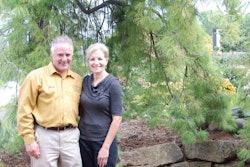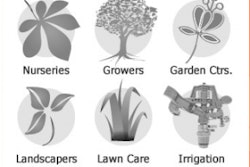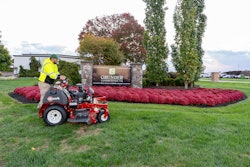When it comes to operating his landscape business, Brian Lemmermann, owner of Somerset Landscape Maintenance, has accomplished a lot since launching his one-man operation as a college student making ends meet by mowing yards with a push mower borrowed from his parents. Now, just 11 years later, at the age of 31, Lemmermann owns a substantial landscape maintenance company with 45 major pieces of equipment, 135 employees, and revenues exceeding $4 million per year.
Down-to-earth business
“A lot of landscapers want to hold on to their secrets, but I’m just the opposite,” he says. “It’s neat to see what other people are doing and also share what I do.”
Lemmermann shares his success and knowledge through numerous community services. As a Boy Scout leader, he assists with Eagle Scout projects, donating landscape advice and supplies. One project involved sending his irrigation crew to work with a scout to install a system at a local elementary school where 100 trees were being planted. He is also the service coordinator for his church, which often involves sending his employees – with pay – to work on landscape projects at a local welfare farm, where produce is donated to homeless shelters.
Lemmermann prides himself on his economical, no-frills operating style. “I’d say the main difference between us and other landscapers is we’re really conscious of what we’re spending,” he says. Because his operation is 95-percent maintenance, with the vast majority being commercial accounts, he does not maintain a fancy office few clients will ever see.
His modest facility is a remodeled single-story home with a corrugated metal shed out back for maintenance and a fenced gravel equipment yard. His property is about 5 acres, so he pays the mortgage by leasing space to a pottery shop, a tropical plant greenhouse, a small residential landscaping company, and several other businesses. He also has plans underway to open a California office.
Lemmermann crunched some numbers and is planning to make room for a mulching operation on his property, allowing him to avoid the $20-per-load fee charged by the Phoenix landfill. He is also considering the environment. “That’s 470 tons of debris per month we will not be sending to the landfill,” he says. “We’ll grind it down and convert it to mulch. I hope we can bag it ourselves and sell it.”
As another money-saving venture, Lemmermann says he intends to install a gas tank to fill all the equipment. While the savings on actual gas costs may be minimal, the amount of man-hours crews will save by not running to the convenience store for gas and snacks each morning will be substantial.
Lemmermann also frequents a local equipment auction house where he relishes picking up a bargain, whether it’s a new truck for his business or a refrigerator for the home he is building. He always scouts the items that will be going on the auction block later that week then researches their value before returning to bid on them.
Even though summertime afternoon temperatures in Chandler regularly exceed 100 degrees, Lemmermann drives a black-on-black Nissan Titan pickup truck with no power windows, no power locks or any other extras. “I needed a truck so I bought the cheapest new truck I could find,” he explains. “Nobody around here wants a black truck, so I got this for less than I could find a used one. The guys know the rules for me are no different.” His business philosophy is very straight-forward. “I tell my managers if we can save a dollar, that’s five dollars we don’t have to earn. I’m always OK with spending money as long as it’s something that will make money,” he says. “That’s one of the reasons we’re really competitive.”
Live and learn
Lemmermann now holds lucrative maintenance accounts with several area golf courses, the Phoenix Forestry Department, the Arizona Department of Transportation, and his former school, Arizona State University, where he followed a pre-dental curriculum and was a place kicker for the football team before becoming distracted by his growing business. “My father worked at a florist and for a landscaper during college and he told me not to do this because landscaping doesn’t make any money,” he says. His father Lynn, and mother Rebecca, are now his biggest fans, helping out at Somerset on a volunteer basis when needed. Lynn even accompanies Brian to trade shows such as the GIE+EXPO.
While his wife Amy helps out managing the finances and performing essential office duties, Lemmermann also puts in some desk time. Getting a head start on the day’s paperwork and the blistering Chandler afternoons means he’s in the office by 4:30 to plan the day before crews arrive at 5. “The heat is intense,” he says. “It starts to really cook by 1 or 2 p.m., so we’re done by 1:30.” While one mechanic remains on duty during the day for problems that crop up, another mechanic works 3 p.m. to 1 a.m. to make certain equipment is ready to roll when crews leave at 5 a.m. “It’s practically a 24-hour operation,” Lemmermann says.
Education plays an important role at Somerset. The intense Arizona temperatures, combined with an annual rainfall in the neighborhood of 4 to 8 inches, has made Lemmermann an irrigation expert out of necessity. He and several of his irrigation techs underwent training with the Arizona Municipal Water User’s Association, which promotes water conservation. He and one other employee also attended six-hour courses every Saturday for a year at the Tempe Desert Botanical Gardens to earn their Certified Desert Landscape Professional designation. Lemmermann is also an Irrigation Association Certified Irrigation Auditor, and an ISA certified arborist.
Lemmermann attributes much of his success to his dedicated employees. “I’ve got a friend with a small company who hires people for a job or two and then lets them go,” he says. “Then he rehires them a week later. There’s no stability for the guys and you’re always looking for and retraining people. That’s the worst.”
One favorite employee is Lupe Carrasco. “He’s the type of guy who uses two backpack blowers at one time – one on his back and one in the front with a handle in each hand,” Lemmermann says.
In return for their loyalty, Lemmermann keeps his crews employed year-round. One winter he purchased a fixer-upper apartment complex and sent some employees to work there, allowing a foreman to live in one of the 10 units for security purposes. “I care about everyone that works at Somerset,” he says. “We rarely place employment ads. We have a list of current employees’ friends or relatives that want to come to work here as soon as we have a position open.”









